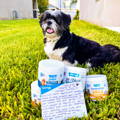Can Dogs Eat Carrots?
Vet Verified
WRITTEN BY DR. REINA HAGSTROM
Jump to Section

When it comes to our canine companions, we often ponder the possibilities of diversifying their diet with wholesome and nutritious treats. Carrots, with their crisp texture and natural sweetness, might be just the answer.
In this article, we'll dive into the world of dogs and carrots. Can dogs eat carrots? Are carrots good for dogs? Let's explore!
Can dogs eat carrots?
So, can dogs have carrots? The answer is a resounding yes. Dogs can eat carrots safely and can even enjoy numerous benefits from this sweet and crunchy vegetable. Carrots are low in calories, with only 25 calories for ½ cup of baby carrots. They’re also packed with essential nutrients that can contribute to your dog's overall health (we’ll get to that in a minute).
One of the primary concerns about feeding carrots to dogs is the risk of choking, especially for smaller breeds and puppies. To avoid this, it's recommended to cut carrots into bite-sized pieces or offer them as carrot sticks for your dog to gnaw on safely. The act of chewing on carrots can also be beneficial for dental health, helping to reduce plaque buildup.
Are carrots good for dogs?
Yes, carrots are good for dogs for a variety of reasons. These vibrant orange vegetables offer a range of health advantages for our furry friends. Most notably, carrots are an excellent source of dietary fiber, which can aid in digestion and promote a healthy gut. For dogs with sensitive stomachs or occasional tummy troubles, carrots can give them a boost of beneficial dietary fiber.
Carrots are also rich in vitamins and minerals, including vitamin A, vitamin K, and potassium. Vitamin A is crucial for maintaining healthy vision and a strong immune system in dogs. Vitamin K plays a vital role in blood clotting, ensuring that your dog's wounds heal properly. Potassium, on the other hand, helps with muscle function and maintaining proper hydration.
Carrots also contain antioxidants, such as beta-carotene, which can help combat oxidative stress and support your dog's overall well-being. These antioxidants can be particularly beneficial for senior dogs or those facing age-related health issues.
Vet Tip
Ingredients like garlic, onion, and salt can be toxic for your dog. While carrots might be a canine-friendly treat, never feed them to your dog if they’ve been seasoned with other ingredients.
Can dogs eat raw carrots?
Now that we know that dogs can eat carrots–and that carrots are good for dogs–let's talk about how to prepare them. Lucky for you, the best way to prepare carrots is to feed them to your dog raw. Many dogs will prefer the satisfying crunch and refreshing taste of a raw carrot over a cooked one.
When feeding your dog raw carrots, wash and peel them thoroughly to remove any dirt or pesticides. You can then cut them into manageable pieces, making it easier for your dog to chew and digest. Remember that moderation is key; while carrots are a healthy treat, they should be a part of a balanced diet and not the primary source of nutrition.
In conclusion, the answer to "Can dogs eat carrots?" is a definite yes. Not only can dogs enjoy carrots safely, but they can also reap various health benefits from these crunchy veggies. Just be mindful of portion sizes, and consider the age and size of your dog when introducing carrots into their diet. With proper preparation and moderation, your furry friend can savor the delightful taste and nutritional goodness of carrots.
Join the Pack!

Sign up for exclusive deals, curated pet tips from veterinarians, and product launches!
Pet Parents are Also Reading
September, 2023
October, 2022
July, 2023
September, 2023
Written by a Vetnique Vet
Dr. Reina Hagstrom, DVM
Dr. Reina Hagstrom is the owner of Mermaid Vet Hospital and the non-profit Mermaid SANDS (Spay And Neuter Dental Services) in Vero Beach, FL. She has a passion for pet dentistry and has been recommending Vetnique products to her patients for years to support a variety of health conditions.
Veterinarian
Vero Beach, FL
Sign up for exclusive deals, curated pet tips from veterinarians, and product launches!





















